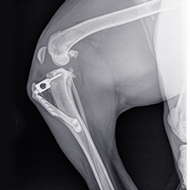Cushing's disease is commonly found in older dogs
Researchers identify genetic mutations responsible for Cushing's disease
Researchers from the Toyko Institute of Technology have identified genetic mutations responsible for Cushing's disease, a potentially fatal glandular condition.
Cushing's disease arises from benign tumours of the pituitary gland, which excessively secrete the hormone adrenocorticotropin (ACTH). Symptoms include weight gain, muscular weakness, mood and reproductive problems. If left untreated, patients can die from the resulting infections and cardiovascular problems.
Previous studies sought to identify mutations that might cause the disease through sequencing candidate genes and microarray studies, but these made little progress.
In this study, published in Nature Genetics, the research team applied a particular type of DNA sequencing, known as 'exome sequencing' to the pituitary corticotrophin adenoma.
The scientists exome-sequenced samples from 10 patients with Cushing's disease and noticed a small number of protein altering mutations in the adenoma tissue. They further identified the gene harbouring the mutations as uniquitin-specific protease 8 (USP8), and were able to pinpoint the region of USP8 prone to mutation in Cushing's disease.
Previous studies of Cushing's diseases have highlighted strong expression of another gene, epidermal growth factor receptor (EGFR). By examining EGFR in cells expressing the USP8, the researchers behind this latest research demonstrated that this was the result of USP8 mutations inhibiting downregulation of EGFR.
The researchers say that their results “not only identify the first of so far enigmatic driver mutations in corticotroph adenomas but also elucidate a novel mechanism by which the EGFR pathway is constitutively activated in human tumours.”
The researchers say that further research will be required for a more detailes understanding of genetic onset of the disease.







 Birmingham Dogs Home has issued an urgent winter appeal as it faces more challenges over the Christmas period.
Birmingham Dogs Home has issued an urgent winter appeal as it faces more challenges over the Christmas period.
